What To Do If Your Pet Gets Sick While Traveling
If your pet gets sick while traveling, it’s even more frightening than when it happens at home. Preplanning can make things easier. Hopefully, you’ll never need those plans. But if the worst does happen, you’ll be glad you’re ready.

Sick Happens
Pets get sick. We hate to even think about it – yet, it’s part of our responsibility as pet parents. Illnesses or accidents that require a visit to the vet are hard enough when you’re home, but it’s a bit more complicated when you’re traveling.
While traveling full time, we’ve made plenty of trips to the veterinarian with dogs. And we’ve learned that a little advanced planning can save a lot of stress. We hope these tips give you something to think about. And that you’ll never have to use them!
READ MORE ⇒ How to Tell If Your Dog Has A Fever
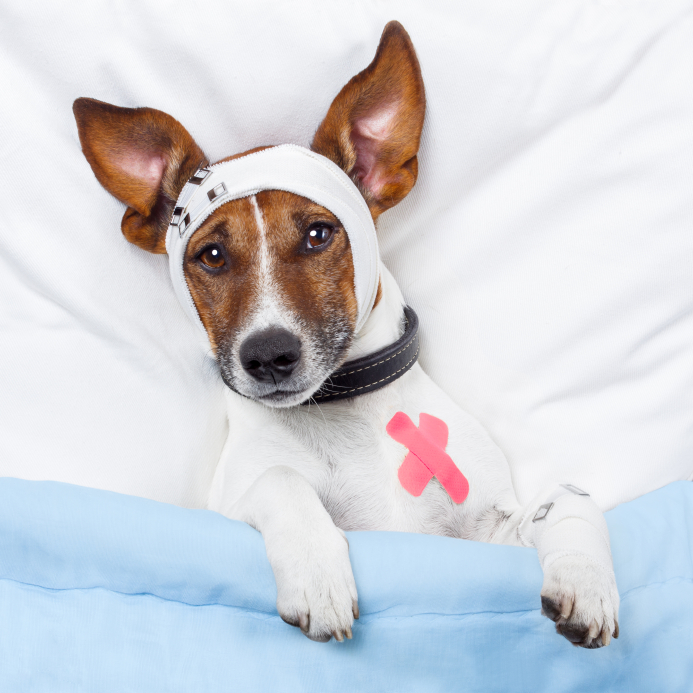
Tips If Your Pet Gets Sick While Traveling – Preparation
1. Pack a good first aid kit. Whether you purchase one or assemble it yourself, you’ll have everything you need to deal with minor cuts, splinters, and stomach upset. Check out our list of recommended first aid supplies on our Amazon store. Or our post on making a DIY pet first aid kit. Then, take some time to become familiar with the contents of the kit. You can even take an online classes on basic first aid procedures before you need to use them.
Talk to your vet about the proper dosages for common medications (like antihistamine or aspirin) that your pet might need to take. There are also some handy books and videos out there that walk you through the steps to help your pet in the most common emergency situations.
READ MORE ⇒ How to Make a Pet First Aid Kit For Your Car
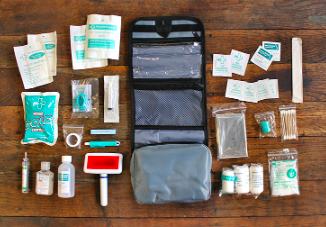
2. Pack your pet’s medical records. In an emergency, remembering your name, much less the details of your dog or cat’s medical history, will be a challenge. Before you leave, scan their medical records and store them on a USB drive. It’s easy to pack, and the emergency veterinarian will have all the information they’ll need at their fingertips.
Some vet offices offer online digital records with a login. If your vet does, make sure to set it up before you leave!
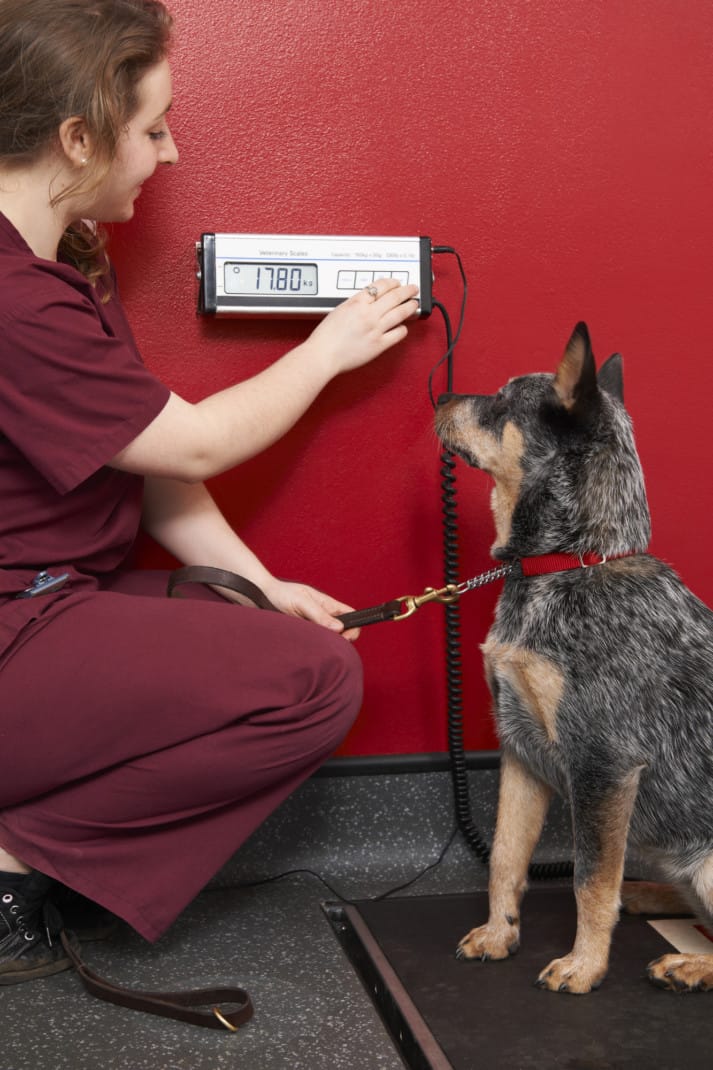
3. Don’t forget your veterinarian’s contact information and fax number. The emergency veterinarian might have questions for your vet. Or they may want to send follow up reports and instructions. Don’t waste time scrambling for contact info. Having the contact information will allow the vet and technician to spend more time on care and less time on paperwork.
4. Have a muzzle that your dog is comfortable in. Many emergency hospitals don’t allow you to accompany your pet into the exam area. And some dogs, when they’re in pain, in an unfamiliar setting, and surrounded by strangers, could react to “defend” themselves. A muzzle will keep everyone safe. And for your dog, wearing a muzzle he’s familiar with will help reduce his stress.
Make sure you practice putting the muzzle on your dog before you need it. Teach your dog that a muzzle is a magical treat dispenser. They’ll be eager to wear it in no time.
READ MORE ⇒ What You Should Know About Emergency Vets Before You Need One
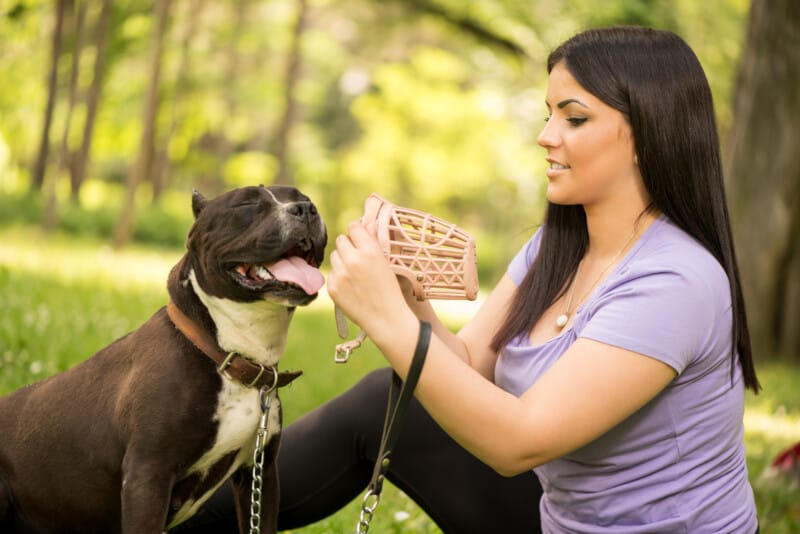
5. Know where the emergency veterinary hospital is located. You probably know right where to take your pet in an emergency when you’re at home. But when you’re traveling you’ll need to research the area’s veterinary hospitals and note their location and hours.
You can search for veterinarians where you’re staying on the GoPetFriendly search tool. You’ll find them under “services,” and under “amenities” you can find ones that are open 24 hours a day. Searching now will save you time when every minute counts.
Tips If Your Pet Gets Sick While Traveling – In The Moment
6. Rely on friends or your social network for veterinary recommendations. Years ago, Ty developed a serious fever and became dehydrated while we were visiting a major city. There was no trouble finding a vet – in fact, there were so many we didn’t know which to choose!
Having a personal recommendation always helps, so we posted our dilemma on our Facebook page, and within minutes got a suggestion for a local vet. The doctor was able to squeeze us in on a Saturday morning, and the care we got was fantastic.
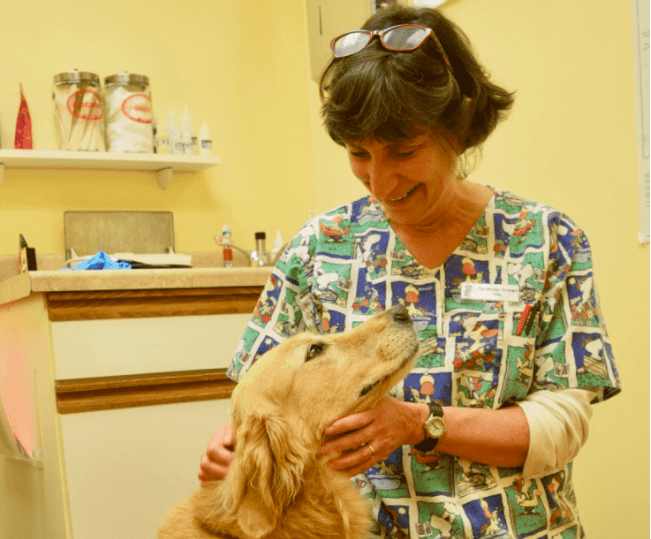
7. Determine the visitation policy. Though emergency veterinary hospitals are unlikely to accommodate you in the trauma area, some allow you to visit your pet when she’s stabilized.
Once, when Ty needed to be observed overnight, the hospital staff allowed me to sit with him outside the kennel any time they weren’t treating another emergency case. It made us both feel better!

When The Emergency Is Over
The emotions and stress of an emergency often make it difficult to think clearly, but a little preparation will ensure you’re able to give your pets the best care possible. And, we hope it’s kind of like grabbing an umbrella on a day with a chance of showers – if you take it, it won’t rain for sure!

If the worst does happen and you felt well prepared, treat yourself. You deserve it!
The post What To Do If Your Pet Gets Sick While Traveling appeared first on GoPetFriendly.com.
Comments
Post a Comment